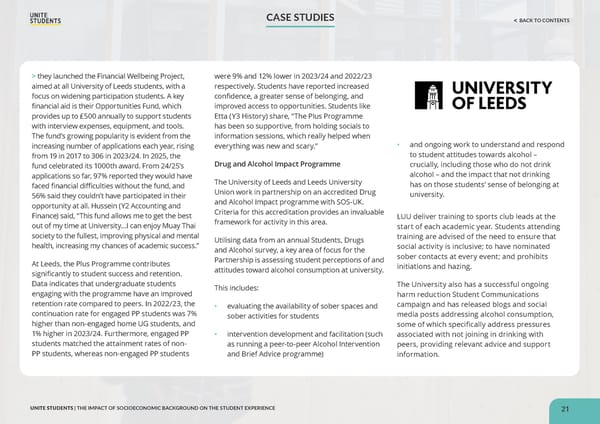< BACK TO CONTENTS UNITE STUDENTS | THE IMPACT OF SOCIOECONOMIC BACKGROUND ON THE STUDENT EXPERIENCE > they launched the Financial Wellbeing Project, aimed at all University of Leeds students, with a focus on widening participation students. A key financial aid is their Opportunities Fund, which provides up to £500 annually to support students with interview expenses, equipment, and tools. The fund’s growing popularity is evident from the increasing number of applications each year, rising from 19 in 2017 to 306 in 2023/24. In 2025, the fund celebrated its 1000th award. From 24/25’s applications so far, 97% reported they would have faced financial difficulties without the fund, and 56% said they couldn’t have participated in their opportunity at all. Hussein (Y2 Accounting and Finance) said, “This fund allows me to get the best out of my time at University…I can enjoy Muay Thai society to the fullest, improving physical and mental health, increasing my chances of academic success.” At Leeds, the Plus Programme contributes significantly to student success and retention. Data indicates that undergraduate students engaging with the programme have an improved retention rate compared to peers. In 2022/23, the continuation rate for engaged PP students was 7% higher than non-engaged home UG students, and 1% higher in 2023/24. Furthermore, engaged PP students matched the attainment rates of non- PP students, whereas non-engaged PP students were 9% and 12% lower in 2023/24 and 2022/23 respectively. Students have reported increased confidence, a greater sense of belonging, and improved access to opportunities. Students like Etta (Y3 History) share, “The Plus Programme has been so supportive, from holding socials to information sessions, which really helped when everything was new and scary.” Drug and Alcohol Impact Programme The University of Leeds and Leeds University Union work in partnership on an accredited Drug and Alcohol Impact programme with SOS-UK. Criteria for this accreditation provides an invaluable framework for activity in this area. Utilising data from an annual Students, Drugs and Alcohol survey, a key area of focus for the Partnership is assessing student perceptions of and attitudes toward alcohol consumption at university. This includes: • evaluating the availability of sober spaces and sober activities for students • intervention development and facilitation (such as running a peer-to-peer Alcohol Intervention and Brief Advice programme) • and ongoing work to understand and respond to student attitudes towards alcohol – crucially, including those who do not drink alcohol – and the impact that not drinking has on those students’ sense of belonging at university. LUU deliver training to sports club leads at the start of each academic year. Students attending training are advised of the need to ensure that social activity is inclusive; to have nominated sober contacts at every event; and prohibits initiations and hazing. The University also has a successful ongoing harm reduction Student Communications campaign and has released blogs and social media posts addressing alcohol consumption, some of which specifically address pressures associated with not joining in drinking with peers, providing relevant advice and support information. 21 CASE STUDIES
 "A Different World": The Impact of Socioeconomic Background on the Student Experience Page 20 Page 22
"A Different World": The Impact of Socioeconomic Background on the Student Experience Page 20 Page 22